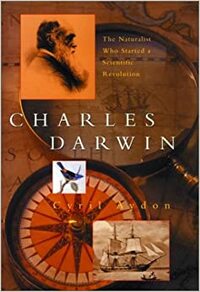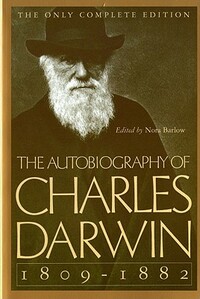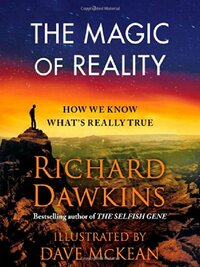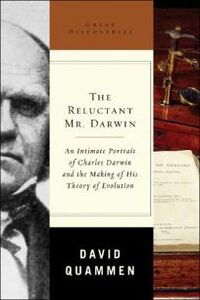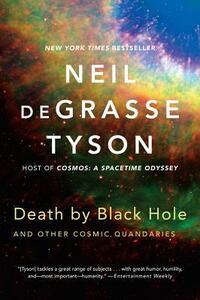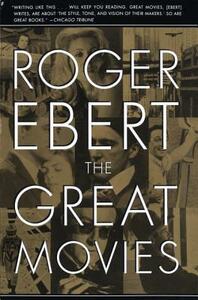Take a photo of a barcode or cover
kevin_shepherd's Reviews (563)
There is a certain magic that occurs when the unbridled enthusiasm of a writer meets the unbridled enthusiasm of a reader. It is lightning in a bottle.
Cyril Aydon's style is so thoroughly enlightening and readable that even the roaming troll herd of evangelicals who didn't bother reading it at all, gave it TWO stars ~ twice their normal allowance for anything with "Darwin" or "Evolution" in the title.
Whether your interest in Charles Darwin is scientific or historical, obsessive or causal, reverent or dismissive, you should read this book. 5 stars.
Cyril Aydon's style is so thoroughly enlightening and readable that even the roaming troll herd of evangelicals who didn't bother reading it at all, gave it TWO stars ~ twice their normal allowance for anything with "Darwin" or "Evolution" in the title.
Whether your interest in Charles Darwin is scientific or historical, obsessive or causal, reverent or dismissive, you should read this book. 5 stars.
"...I could not employ my life better than in adding a little to natural science. This I have done to the best of my abilities, and critics may say what they like, but they cannot destroy this conviction." ~Charles Darwin (pg 104)
A very atypical autobiography, written more for the benefit of his children and grandchildren than for public consumption. He was indeed a very modest man, even his most prestigious achievements are recounted with gratitude and humility. He speaks very frankly about the many people he likes and the very few that he does not, and his sense of humor is evident throughout. I came away with a greater appreciation for Darwin the man, and a deeper reverence for Darwin the ever-meticulous naturalist.
"...if I had to live my life again I would have made a rule to read some poetry and listen to some music at least once every week; for perhaps the parts of my brain now atrophied could thus have been kept active through use. The loss of these tastes is a loss of happiness, and may possibly be injurious to the intellect, and more probably to the moral character, by enfeebling the emotional part of our nature." ~C.D. (pg 113)
A very atypical autobiography, written more for the benefit of his children and grandchildren than for public consumption. He was indeed a very modest man, even his most prestigious achievements are recounted with gratitude and humility. He speaks very frankly about the many people he likes and the very few that he does not, and his sense of humor is evident throughout. I came away with a greater appreciation for Darwin the man, and a deeper reverence for Darwin the ever-meticulous naturalist.
"...if I had to live my life again I would have made a rule to read some poetry and listen to some music at least once every week; for perhaps the parts of my brain now atrophied could thus have been kept active through use. The loss of these tastes is a loss of happiness, and may possibly be injurious to the intellect, and more probably to the moral character, by enfeebling the emotional part of our nature." ~C.D. (pg 113)
Written for younger readers, ‘The Magic of Reality’ is a superb, easy to understand introduction to science and the scientific method. Dawkins puts biology, geology and astronomy in terms that anyone can understand, while simultaneously infusing every syllable with a sense of wonder and awe. His passion for science, all science, is downright contagious - making this an ideal book for that budding astrophysicist or anthropologist in the family (or that scientifically illiterate relation who still swears by astrology or dianetics or Oral Roberts).
“By the cold Darwinian logic of natural selection, evolution codifies happenstance into strategy.” ~David Quammen
I so enjoyed this biography of Charles Darwin that I consumed all 300+ pages in less than 8 hours. Quammen writes with contagious enthusiasm. No detail of Down House seems unworthy of contemplation - even the beetles and barnacles are animated and interesting.
I so enjoyed this biography of Charles Darwin that I consumed all 300+ pages in less than 8 hours. Quammen writes with contagious enthusiasm. No detail of Down House seems unworthy of contemplation - even the beetles and barnacles are animated and interesting.
Brian Switek might be a little much if your interest in paleontology is casual, but for the serious dinosaur buff and fossil freak he is a guru in gabardine.
My only issue with Switek’s take, and it is a relatively minor quibble, is his assertion that ‘punctuated equilibrium’ is the most probable catalyst for speciation. I’m just not onboard with the Stephen Jay Gould theorem that evolution is “rare and geologically rapid.”*
*I have a rather detailed dissertation on the shortcomings of punctuated equilibrium theory, but I’ll save that for my review(s) of Gould.
My only issue with Switek’s take, and it is a relatively minor quibble, is his assertion that ‘punctuated equilibrium’ is the most probable catalyst for speciation. I’m just not onboard with the Stephen Jay Gould theorem that evolution is “rare and geologically rapid.”*
*I have a rather detailed dissertation on the shortcomings of punctuated equilibrium theory, but I’ll save that for my review(s) of Gould.
There is so much more to this collection of marvelous essays than just black hole theorem. For instance, there is helioseismology, deep-space planetology, celestial mechanics (Lagrange points), matter-antimatter asymmetry, plasma cosmology, circumstellar habitability, astronomical spectrography, gravitational lensing, and (my personal favorite) the cinematic propagation of scientific illiteracy.
The thing is, none of this is over your head. A little quality time with deGrasse Tyson and you too will be conversational in Kepler. Trust me.
The thing is, none of this is over your head. A little quality time with deGrasse Tyson and you too will be conversational in Kepler. Trust me.
My first impulse after reading this was to google “recreational hallucinogens of the 1860s.” I decided instead to bask in the awe of an imagination without limits and not ask too many questions.
“I demand that a film express either the joy of making cinema or the agony of making cinema. I am not at all interested in anything in between.” ~Roger Ebert, The 400 Blows
“It does not hook its effects on specific plot points, nor does it ask us to identify with Dave Bowman or any other character. It says to us: We became men when we learned to think. Our minds have given us the tools to understand where we live and who we are. Now it is time to move on to the next step, to know that we live not on a planet, but among the stars, and that we are not flesh, but intelligence.” ~Roger Ebert, 2001: A Space Odyssey
Known as a humanist and a populist, Roger Ebert critiqued films from 1967 to 2013. That’s 46 years of bearing witness to the best (and worst) of world cinema. These reviews are some of his best.
“It does not hook its effects on specific plot points, nor does it ask us to identify with Dave Bowman or any other character. It says to us: We became men when we learned to think. Our minds have given us the tools to understand where we live and who we are. Now it is time to move on to the next step, to know that we live not on a planet, but among the stars, and that we are not flesh, but intelligence.” ~Roger Ebert, 2001: A Space Odyssey
Known as a humanist and a populist, Roger Ebert critiqued films from 1967 to 2013. That’s 46 years of bearing witness to the best (and worst) of world cinema. These reviews are some of his best.
An Unvarnished Homage
Laura Kaplan’s ethnography of “Jane,” Chicago’s underground abortion service (circa 1969 - 1973), is not a book of propaganda. She by no means idealizes the service which, in the beginning, had some serious faults. The women themselves were a mixed lot and Kaplan is candid and forthright about their shortcomings as well as their contributions to the cause.
My only qualm with Kaplan is her affinity for graphic surgical detail. If I, for instance, were recounting the exploits of a few conscientious laymen doling out secret vasectomies, do I really need to elaborate on the procedural minutia? Keep a bucket handy if itemized medical procedurals make you a little queazy.
Laura Kaplan’s ethnography of “Jane,” Chicago’s underground abortion service (circa 1969 - 1973), is not a book of propaganda. She by no means idealizes the service which, in the beginning, had some serious faults. The women themselves were a mixed lot and Kaplan is candid and forthright about their shortcomings as well as their contributions to the cause.
My only qualm with Kaplan is her affinity for graphic surgical detail. If I, for instance, were recounting the exploits of a few conscientious laymen doling out secret vasectomies, do I really need to elaborate on the procedural minutia? Keep a bucket handy if itemized medical procedurals make you a little queazy.
